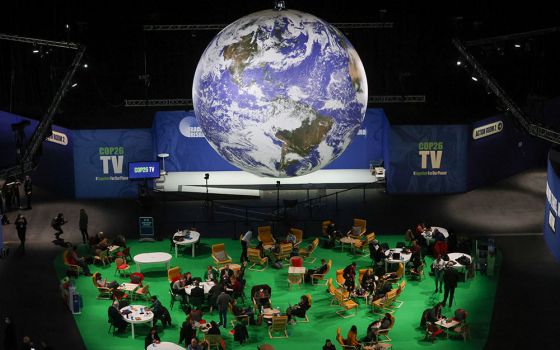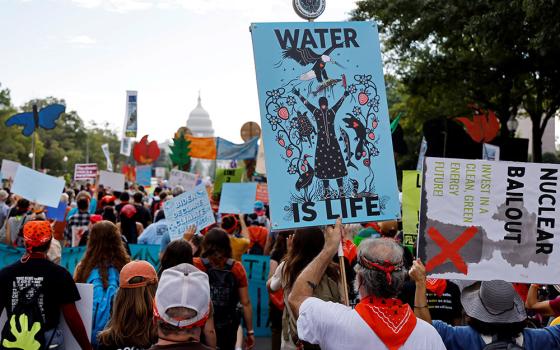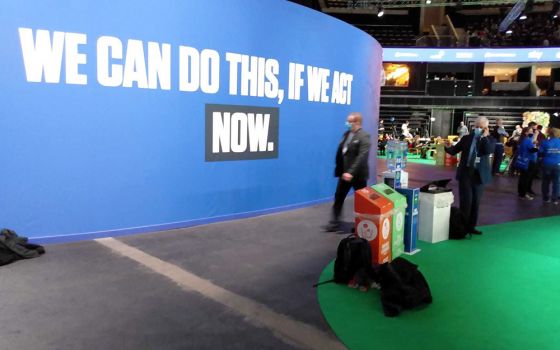Flanked by leaders of major world religions Oct. 4 at the Vatican, Pope Francis signs a joint appeal to government leaders to curb global warming and heal the planet. (CNS/Paul Haring)
In response to the "grave threat" of climate change, heads of the world's major religions united at the Vatican to issue an unprecedented joint appeal to government leaders at next month's United Nations climate summit, calling for "urgent, radical and responsible action" to drastically curb greenhouse gas emissions and for the world's wealthiest countries to lead in healing the planet.
The nearly 40 religious figures, among them Pope Francis, Ecumenical Patriarch Bartholomew and Islamic, Jewish, Buddhist and Hindu leaders, also pledged to increase awareness of the climate crisis and actions to address it within their own congregations.
"We are currently at a moment of opportunity and truth. We pray that our human family may unite to save our common home before it is too late," the declaration read. "Future generations will never forgive us if we squander this precious opportunity."
"We have inherited a garden: we must not leave a desert to our children," the faith leaders wrote.
The joint statement, issued Oct. 4, the feast day of St. Francis of Assisi, the patron saint of ecology, outlined the expectations of the world's major religions — representing about half the global population — for the COP26 U.N. climate conference, set for Nov. 1-12 in Glasgow, Scotland.
"We plead with the international community, gathered at COP26, to take speedy, responsible and shared action to safeguard, restore and heal our wounded humanity and the home entrusted to our stewardship," the faith declaration said.
"We appeal to everyone on this planet to join us on this common journey, knowing well that what we can achieve depends not only on opportunities and resources, but also on hope, courage, solidarity and good will."
A portion of the statement was read at a "Faith and Science Toward COP26" ceremony at the Vatican, where faith leaders, all wearing masks, signed the document. Francis, who signed last, handed the appeal over to Italian Foreign Minister Luigi Di Maio and Alok Sharma of Britain, president of COP26. Officials from embassies to the Holy See from both nations, which are co-hosting the climate conference, worked with the Vatican to organize the statement.
Sharma described the appeal as "a powerful call to action for the world." He called for an alliance of faith leaders, scientists and youth to "turn the tide" on climate change.
"Doing so requires us all to play our part, every country in every part of society mounting a global effort led by those most human qualities, reason and morality, the head and the heart," he said.
Orthodox Ecumenical Patriarch Bartholomew of Constantinople addresses the "Faith and Science: Towards COP26" meeting at the Vatican, as Pope Francis looks on. (CNS/Paul Haring)
Each religious leader present spoke briefly about the need to protect the environment. Those unable to attend because of the coronavirus pandemic sent video messages. At the conclusion, each poured soil into a potted olive tree to be planted in the Vatican gardens. They met again in the afternoon to discuss how faith and science can work together to raise awareness and cooperate further.
In prepared remarks for the event, Francis said that the world's religious and spiritual traditions and science both stress the interconnectedness of our world. Recognizing the interrelations among species, he said, reveals not only the harmful effects of human activity on ecosystems, but also possible solutions.
"COP26 in Glasgow represents an urgent summons to provide effective responses to the unprecedented ecological crisis and the crisis of values that we are presently experiencing, and in this way to offer concrete hope to future generations. We want to accompany it with our commitment and our spiritual closeness," the pope said.
COP26 will be the first U.N. climate conference in two years. An abbreviated, virtual meeting was held in December 2020 because of the coronavirus pandemic. This year's event is viewed as the most consequential climate summit since the 2015 COP21, which produced the landmark Paris Agreement in which the world's nations committed for the first time to cut emissions in an effort to limit global warming to 1.5 C above pre-industrial levels.
The faith leaders, who conferred throughout the year in multiple meetings with leading scientists, including Hoesung Lee, chair of the U.N. Intergovernmental Panel on Climate Change, said that "time is running out" and that this decade may be the last chance left "to restore the planet."
Average temperatures already have risen by more than 1 C and are on track to reach 2.7 C by the end of the century, based on countries' current greenhouse gas emission reduction commitments, according to a recent IPCC report.
Advertisement
"The degradation of our common home due to climate change is a symptom of deeper social ills," Joachim von Braun, president of the Pontifical Academy of Sciences told the gathering. "For this reason, it is essential that in addressing these challenges, science and faith combine forces."
Climate change solutions must include changes in consumption, technological breakthroughs and policies that recognize that human and ecosystem health are inextricably connected, the scientist said.
The religious leaders urged governments to "achieve net zero carbon emissions as soon as possible." Wealthier nations, which are the major emitters, must lead that effort, they said, as well as follow through on long-promised financing— $100 billion annually through the Green Climate Fund — to help less-industrialized nations curb emissions and adapt to climate change.
They also urged developed nations to commit to "loss and damage" payments to less-industrialized countries for climate-related destruction that has already occurred.
They advocated a new economic model that prioritizes human dignity, inclusivity, ecologically friendly practices over exploitation and excess, and "one based not on endless growth and proliferating desires, but on supporting life."
The statement also called for special attention to the rights of Indigenous peoples, an end to biodiversity loss, responsible financing by banks and investors, and a just transition to a clean energy economy, with particular attention to employment for people working in the fossil fuel industry.
Calling climate change a moral issue, they stressed the importance of education and the "crucial" role of religious traditions in bringing about an "ecological conversion" among all people.
The faith leaders also pledged to more active political participation on environmental issues, and to take actions within their own communities to reduce emissions, pursue sustainability in their buildings and properties, encourage simpler lifestyles, seek out ethically produced goods and services, and apply environmentally and socially responsible standards to investments, including shifting from fossil fuels to renewable energy.
An interfaith program called "Faith Plans for People and the Planet," aimed at leveraging religious groups' assets and investments, was also launched Oct. 4.
To involve Catholics, the Vatican is creating the Laudato Si' Action Platform, a seven-year roadmap to sustainability for all types of Catholic institutions, from families and dioceses to hospitals and schools.
Pope Francis leads the "Faith and Science: Towards COP26" meeting Oct. 4. Leaders of major world religions, who have been meeting with scientists, issued a statement calling for strong climate action from governments and committing their congregations to do the same. (CNS/Paul Haring)
Religious leaders and institutions have increasingly turned attention to climate change in recent years.
Climate negotiators have said Francis' encyclical "Laudato Si', on Care for Our Common Home," along with statements from other faith leaders and the world's bishops, had a positive influence on COP21 in 2015. The hope is that this new interreligious appeal will yield similar results in Glasgow.
More and more, the Vatican has emphasized the importance of a united religious voice on climate change. In November, the Vatican's council on interreligious dialogue hosted a multi-day interfaith event to mark the five-year anniversary of Laudato Si'. And in September, Francis joined Bartholomew and Archbishop Justin Welby of Canterbury in a first-ever joint message on environmental sustainability by the three Christian leaders.
Plans for the Oct. 4 faith appeal began in January. Since then, faith leaders have met eight times with scientists, including Lee of the IPCC and the heads of the Pontifical Academies of Sciences and Social Sciences.
Before the event, von Braun told EarthBeat he was "pleasantly surprised" with the faith leaders' openness to scientific advice and is optimistic the statement will deliver "a powerful message" to political leaders at COP26.
"This summit comes at a point in time when the world knows more, is concerned more and wants to see more action. And the people are moving together. That's why this new alliance between science and faith will matter at the COP," he said.






